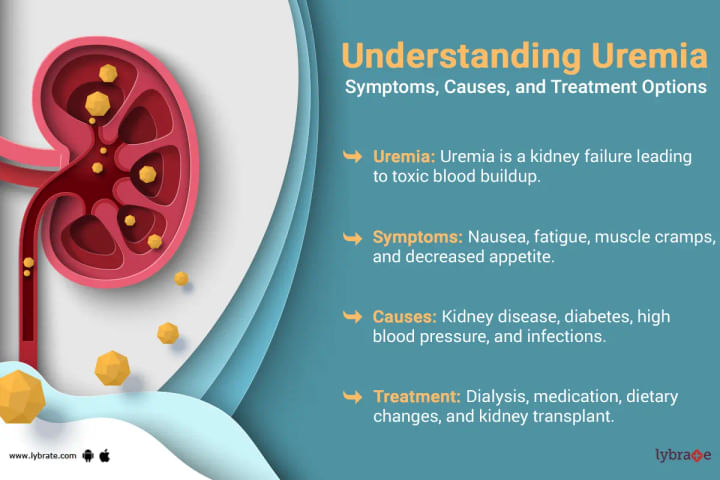Unraveling the Mystery of Uremia: A Life-Threatening Condition
Uremia, a term that may sound unfamiliar to many, is a serious medical condition that can have a profound impact on a person's health. It is a condition in which the waste products of metabolism accumulate in the bloodstream, causing a wide range of symptoms and potential health complications. Despite its potential severity, uremia is not well understood by many people and is often overlooked as a serious condition.
Uremia is fundamentally brought on by the kidneys' inability to effectively remove waste from the bloodstream. The kidneys are in charge of filtering extra fluid, waste, and poisonous materials out of the blood so that they can be eliminated from the body through urine. When the kidneys are unable to perform this critical function, waste products build up in the bloodstream, leading to a condition known as uremia.
Uremia can cause a wide range of symptoms, including nausea, fatigue, itching, weight loss, anemia, and confusion. Uremia can cause serious health issues, such as heart disease, nerve damage, and even death, in more extreme situations. Furthermore, uremia can worsen other medical disorders like diabetes or high blood pressure, making it even worse.
It is significant to remember that uremia is not a sickness in and of itself, but rather a sign of a more serious condition. As a result, rather than only treating the symptoms, treating uremia often entails addressing the underlying cause of the disorder. This can involve managing other health conditions, making lifestyle changes, or undergoing medical procedures.
Symptoms of Uremia
Uremia, a condition in which waste products accumulate in the bloodstream due to a failure of the kidneys to properly filter these substances, can have a range of symptoms that may go unnoticed until the condition has progressed. Early detection and treatment of uremia can greatly improve a person's chances of a successful outcome, which is why it is important to be aware of the symptoms of this condition.
Here are some common symptoms of uremia;
- Nausea and vomiting
- Fatigue and weakness
- Itching
- Loss of appetite
- Weight loss
- Anemia
- Confusion and disorientation
- Seizures
- Coma
- Shortness of breath
- Swelling in the legs, ankles, and feet
- Decreased urination
- Dark-colored urine
It is crucial to remember that these symptoms are not always indicative of uremia and might be brought on by a wide range of illnesses. However, it is advised that you get medical help as soon as you can if you suffer any of these symptoms. A doctor can conduct tests to identify the origin of your symptoms and administer the proper care to help you manage your condition.
Roots Causes of Uremia
Uremia, a life-threatening condition characterized by the accumulation of waste products in the bloodstream, can have a number of underlying causes. Understanding these causes can help individuals take steps to prevent the development of uremia and protect their health.
Here are some common causes of uremia;
- Chronic kidney disease
- Acute kidney injury
- Glomerulonephritis
- Nephrotic syndrome
- Hypertensive nephropathy
- Polycystic kidney disease
- Blockage in the urinary tract
- Dehydration
- Certain medications
- Chronic conditions like diabetes and high blood pressure
It is significant to remember that the cause of uremia may occasionally be a mystery. However, a comprehensive medical evaluation can help determine the underlying cause of the condition and guide the development of an appropriate treatment plan. Early diagnosis and treatment of uremia can improve the chances of a successful outcome, so it is important to seek medical attention if you experience any symptoms or have concerns about your kidney health.
Treatment Options To Tackle Uremia
Uremia, a condition characterized by the accumulation of waste products in the bloodstream due to a failure of the kidneys to properly filter these substances, can have a serious impact on a person's health. However, with appropriate treatment, individuals with uremia can improve their outcomes and reduce the risk of complications.
Here are some common treatment options for uremia;
Managing underlying conditions
Treating underlying health conditions, such as diabetes or hypertension, can help improve kidney function and reduce the risk of uremia.
Lifestyle changes
Changing your diet and drinking more water can improve kidney health and lower your risk of developing uremia.
Medications
Certain drugs, such erythropoietin, can aid in enhancing red blood cell formation and reducing anemia.
Dialysis
In severe cases of uremia, dialysis may be necessary to remove waste products from the bloodstream and support kidney function.
Kidney transplant
In some circumstances, a kidney transplant may be required to cure uremia and return the kidneys to normal function. Remember that the underlying cause of your uremia and how severe your symptoms are will determine the best course of treatment for you. A doctor can conduct a thorough examination and create a treatment strategy that is customized to your individual requirements.
Early diagnosis and treatment of uremia can greatly improve a person's chances of a successful outcome, so it is important to seek medical attention if you experience any symptoms or have concerns about your kidney health.
Prevent Uremia And Protect Your Kidney Health With These Simple Steps
Uremia, a condition in which waste products accumulate in the bloodstream due to a failure of the kidneys to properly filter these substances, can have serious health consequences. However, by taking simple steps to protect your kidney health, you can reduce your risk of developing uremia and improve your overall health.
Here are some recommendations for avoiding uremia;
Maintain a healthy diet
A nutritious diet that is high in fiber and low in salt can support kidney health and lower the risk of uremia.
Stay hydrated
Drinking enough of water can improve kidney health and aid in the removal of waste materials from your body.
Exercise regularly
Regular exercise can lower the risk of uremia and enhance blood flow to the kidneys.
Manage underlying health conditions
Treating underlying health conditions, such as diabetes or hypertension, can help improve kidney function and reduce the risk of uremia.
Limit alcohol consumption
Excessive alcohol consumption can strain the kidneys and increase the risk of uremia.
Avoid overuse of pain medications
Nonsteroidal anti-inflammatory drugs (NSAIDs), which are commonly used as painkillers, can strain the kidneys and raise the risk of uremia when used in excess. It is crucial to remember that these advice are only general recommendations and might not apply to everyone.
A doctor can provide personalized recommendations for protecting your kidney health and reducing your risk of uremia based on your individual health status and lifestyle factors. By taking steps to protect your kidney health, you can reduce your risk of developing uremia and improve your overall health.
Serious Consequences of Waste Buildup in the Bloodstream
Uremia, a condition in which waste products accumulate in the bloodstream due to a failure of the kidneys to properly filter these substances, can have serious health consequences. Understanding the potential complications of uremia can help individuals take steps to prevent the development of this condition and protect their health.
Here are some potential complications of uremia;
Anemia
Anemia, a condition where there is a reduction in the amount of red blood cells in the bloodstream, can result from uremia.
Nervous system dysfunction
Uremia can lead to changes in mental status, confusion, and even coma.
Electrolyte imbalances
Uremia can lead to imbalances in electrolytes, such as potassium, sodium, and calcium, which can have serious health consequences.
Cardiovascular disease
Heart attacks and strokes are among the cardiovascular conditions that uremia can make more likely.
Weak bones
Loss of bone density and an elevated risk of osteoporosis can result from uremia.
Skin problems
Uremia can lead to itchy skin and other skin problems.
Pericarditis
Pericarditis, an inflammation of the sac that surrounds the heart, can result from uremia.
Muscle wasting
Uremia can lead to muscle wasting and weakness.
It is important to note that these are just some of the potential complications of uremia, and the specific complications that an individual may experience will depend on the underlying cause of their condition and the severity of their symptoms.
Early diagnosis and treatment of uremia can greatly improve a person's chances of a successful outcome and reduce the risk of serious complications.
Conclusion
Uremia is a serious condition in which waste products accumulate in the bloodstream due to a failure of the kidneys to properly filter these substances. If left untreated, it can result in a variety of symptoms and major health issues. By understanding the causes of uremia, recognizing the symptoms, exploring treatment options, and taking steps to prevent the development of this condition, individuals can protect their health and reduce the risk of serious consequences.
It's critical to get medical help as soon as you can if you have concerns about your kidney health or exhibit uremia symptoms.



+1.svg)
